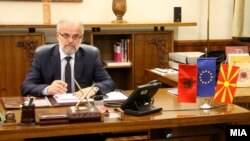Macedonian parliament's new ethnic Albanian speaker enters office
| Publisher | Radio Free Europe/Radio Liberty |
| Publication Date | 3 May 2017 |
| Cite as | Radio Free Europe/Radio Liberty, Macedonian parliament's new ethnic Albanian speaker enters office, 3 May 2017, available at: https://www.refworld.org/docid/59818d546.html [accessed 21 May 2023] |
| Disclaimer | This is not a UNHCR publication. UNHCR is not responsible for, nor does it necessarily endorse, its content. Any views expressed are solely those of the author or publisher and do not necessarily reflect those of UNHCR, the United Nations or its Member States. |
May 03, 2017 14:38 GMT
By RFE/RL's Balkan Service
 Talat Xhaferi, the newly elected speaker of Macedonia's parliament, entered his office during the early morning hours of May 3.
Talat Xhaferi, the newly elected speaker of Macedonia's parliament, entered his office during the early morning hours of May 3.
SKOPJE – Thousands of nationalist demonstrators were continuing their protests in Skopje on May 3 against a proposed governing coalition of Social Democrats and ethnic Albanian parties, hours after Macedonia's first ethnic Albanian speaker of parliament took physical possession of the speaker's office.
Talat Xhaferi, the newly elected speaker of parliament, entered the office during the early morning hours of May 3, where he met with the European Union's ambassador to Macedonia, Samuel Zbogar.
In a statement later on May 3, Xhaferi's office said he is now conducting his duties normally as parliamentary speaker and that all of the parliament's administrative services are functioning.
The move came a day after nationalist VMRO-DPMNE legislators occupied the office and blocked an attempt by Xhaferi to enter.
VMRO-DPMNE lawmakers reacted to Xhaferi's May 3 statement by repeating their charges that his election to the speaker's post was "illegal" because it did not follow standard parliamentary procedures.
The EU and the United States have both taken steps to recognize Xhaferi as the legitimately elected speaker.
Meanwhile, nationalist protesters called for another mass demonstration on May 3.
Those demonstrators, most of whom are VMRO-DPMNE supporters, say Macedonia's national unity is threatened by a coalition deal struck between the Social Democrats to govern alongside ethnic Albanian parties.
The accord would sideline the VMRO-DPMNE party of former Prime Minister Nikola Gruevski, which opposes a plan to make Albanian the second official language of Macedonia.
Parliamentary Crime Scene
On April 27, the day Xhaferi was elected as parliamentary speaker, angry supporters of the VMRO-DPMNE stormed inside parliament and assaulted Social Democratic leader Zoran Zaev along with several ethnic Albanian lawmakers, bloodying them and sending some to the hospital.
With investigations into that violence continuing on May 3, authorities were treating Macedonia's parliament building as a crime scene.
Although Zaev's Social Democrats and three ethnic Albanian parties control a majority of seats in parliament, President Gjorge Ivanov – an ally of the VMRO-DPMNE – has refused to take action on his constitutional authority to grant the alliance a formal mandate to form a new government.
That has prevented Zaev's new coalition from formally presenting a new government for a vote of approval by parliament.
Washington and Brussels both insist that, under Macedonia's constitution, a coalition that controls a majority of seats in parliament has the right to form a new government.
The U.S. State Department sent a high-level envoy to Skopje during the weekend to urge leaders of the VMRO-DPMNE to peacefully cede power to the coalition led by Zaev.
The VMRO-DPMNE and its allies say strong opposition to Zaev's proposed coalition, seen in nightly demonstrations by nationalists during the past two months, is evidence that the public does not want the VMRO-DPMNE to vacate power.
They argue that Macedonia needs to call new elections. They claim that the current impasse was caused by inconclusive results in December's election rather than the refusal of Ivanov to present Zaev's majority coalition with the mandate it needs to conduct a parliamentary vote on a new government.
With reporting by AFP
Link to original story on RFE/RL website
